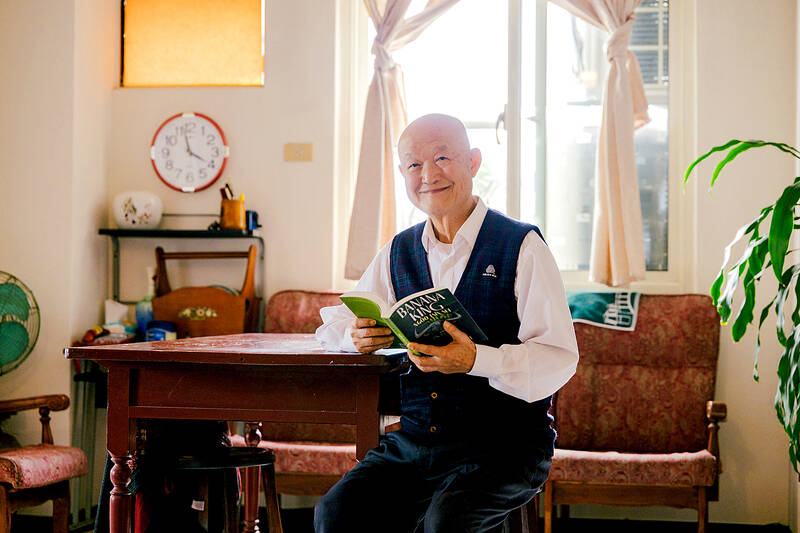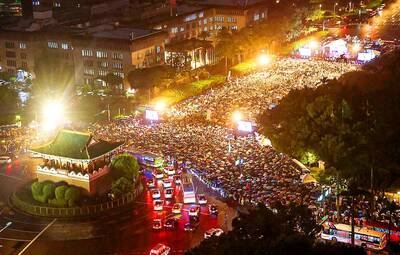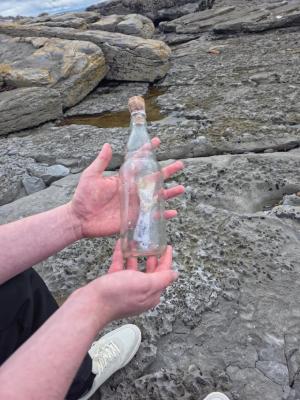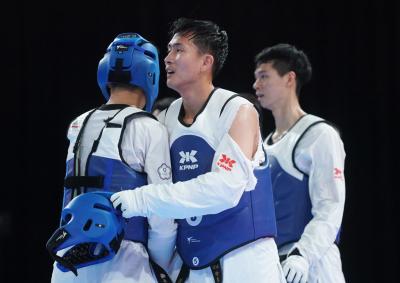The English translation of Banana King Ngoo Tsin-sui (蕉王吳振瑞), a historical novel by Taiwanese author Lee Wang-tai (李旺台), has won the bronze prize in the historical fiction category at the Foreword Reviews magazine Indies Book of the Year Awards 2024.
Lee’s book, published in English by Shadelandhouse Modern Press, recounts the true story of Ngoo Tsin-sui, who “massively expanded Taiwan’s banana trade during dark days of martial law,” Kirkus Reviews said.
“Lee’s depiction of Tsin-sui as an innovator who put cash in the hands of small farmers is inspiring, and his story offers life lessons as well as obvious warnings about authoritarian government,” the US book review magazine said.

Photo courtesy of Mirror Fiction via CNA
After receiving the award, Lee said: “I feel lucky to present life stories from this island and show the character of its people.”
“I want to write Taiwan well, write Taiwanese people well, so that foreigners can truly understand the spirit of this land,” he added.
Translator Timothy Smith, a former translator at the Taipei Times, said he was motivated by the book’s portrayal of Taiwan’s political journey through the then-authoritarian Chinese Nationalist Party (KMT) period.
Smith said the book reminded him of Taiwanese friends whose families experienced cultural and linguistic suppression.
To preserve the novel’s linguistic diversity when translating into natural-sounding English, Smith said he retained terms in the Taiwanese (Hokkien), Hakka and Japanese languages.
According to Foreword Reviews, the annual awards celebrate outstanding books published by small, independent and university presses.
“Foreword’s dedicated editors carefully selected approximately 12 finalists per genre, which were then presented to individual librarians and booksellers entrusted with the challenging task of determining the Gold, Silver, Bronze and Honorable Mention winners,” the magazine said.
Alongside Banana King Ngoo Tsin-sui in the historical fiction category, Donna Coffey Little’s Wofford’s Blood won gold, while David Ciminello’s The Queen of Steeplechase Park won silver.

FINAL COUNTDOWN: About 50,000 attended a pro-recall rally yesterday, while the KMT and the TPP plan to rally against the recall votes today Democracy activists, together with arts and education representatives, yesterday organized a motorcade, while thousands gathered on Ketagalan Boulevard in Taipei in the evening in support of tomorrow’s recall votes. Recall votes for 24 Chinese Nationalist Party (KMT) lawmakers and suspended Hsinchu City mayor Ann Kao (高虹安) are to be held tomorrow, while recall votes for seven other KMT lawmakers are scheduled for Aug. 23. The afternoon motorcade was led by the Spring Breeze Culture and Arts Foundation, the Tyzen Hsiao Foundation and the Friends of Lee Teng-hui Association, and was joined by delegates from the Taiwan Statebuilding Party and the Taiwan Solidarity

Instead of threatening tariffs on Taiwan-made chips, the US should try to reinforce cooperation with Taiwan on semiconductor development to take on challenges from the People’s Republic of China (PRC), a Taiwanese think tank said. The administration of US President Donald Trump has threatened to impose across-the-board import duties of 32 percent on Taiwan-made goods and levy a separate tariff on semiconductors, which Taiwan is hoping to avoid. The Research Institute for Democracy, Society, and Emerging Technology (DSET), a National Science and Technology Council think tank, said that US efforts should focus on containing China’s semiconductor rise rather than impairing Taiwan. “Without

An SOS message in a bottle has been found in Ireland that is believed to have come from the Taiwanese captain of fishing vessel Yong Yu Sing No. 18 (永裕興18號), who has been missing without a trace for over four years, along with nine Indonesian crew members. The vessel, registered to Suao (蘇澳), went missing near Hawaii on Dec. 30, 2020. The ship has since been recovered, but the 10 crew members have never been found. The captain, surnamed Lee (李), is believed to have signed the note with his name. A post appeared on Reddit on Tuesday after a man

President William Lai (賴清德) today condemned an alleged attempt by two Chinese to snatch a letter of congratulations handed to Taiwan’s taekwondo team after they won silver at the Summer World University Games in Essen, Germany, yesterday. A Chinese man and woman reportedly tried to snatch a congratulatory letter to athletes Hung Jiun-yi (洪俊義), Jung Jiun-jie (鍾俊傑) and Huang Cho-cheng (黃卓乘) from the Ministry of Education, and then argued with media employees. “Why are you taking our things?” the media employees asked. “Does that say Chinese Taipei?” the two Chinese reportedly said. Following the incident, Sports Administration Director-General Cheng Shih-chung (鄭世忠) wrote on